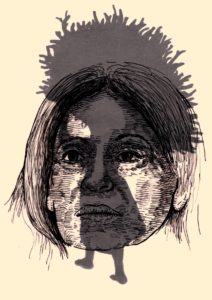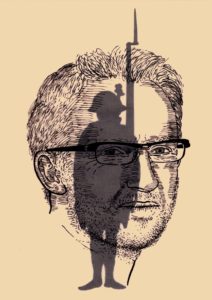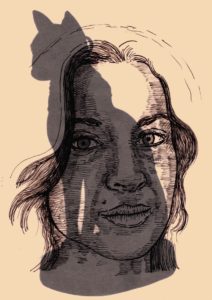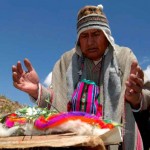Almira Hess – And As Far As What I Wanted & Other Poems
And As Far As What I Wanted
And as far as I wanted to further explain to you
what every sign says.
After all, surely you understand the way of colors,
the gilded light, the chlorophyll light,
the light of pain and the light of need and vigilant light
and the light of an arc in the sky
splitting through again to seed with drops of sun suddenly burning
the essence of yearning.
The light of the eyes of the dogs
shine loyalty in the dark to their masters.
The growing shadow of darkness placed late
in fading time.
How the radiant blackness disseminates its night
And how the arrows’ whiteness smothers its light
How everything is lucid from so much pain.
– Translated from the Hebrew by Yonina Borvick
From And The Moon Drips Madness
There was a time
when I’d have said:
I won’t defile myself
with this contemptible Orient,
I’ll relegate my ancestral
home to oblivion,
my mother’s owlish visage
weeping over the ruins,
my father’s face like a cherub-
the Lord – graced him not.
And I also said:
The West, for instance,
Has no cares to its spirit,
well-done within, singed to the shrouds.
East and West I’ll set out in a strong beat
for there is no ark
to bestir myself, if daughter
departs more spirit
to make eagles soar.
– Translated from the Hebrew by Ammiel Alcalay
Then Slake Him From
Then slake him from
A wineskin flowing and a wineskin of milk and a wineskin of loveliness
Kiss and weep, for the time of loving has come.
Woman-dust-earth seeped into the lust in his touch
Keen after him
Kiss his footprints
Do not bind his freedom.
Place him as a cock
Rising early, at sun’s fire,
As a madman, his body screaming desire.
– Translated from the Hebrew by Marsha Weinstein
The Art Of Cooking – Chicken Schnitzel Recipe
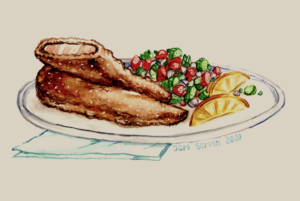 The Schnitzel has been brought by the European Jews to Israel, and currently everyone enjoys it!
The Schnitzel has been brought by the European Jews to Israel, and currently everyone enjoys it!
I visited many households in Israel, and at any time of the day or night one can enjoys a Chicken Schnitzel. The Israeli version of Schnitzel is recognizable because of the white sesame seeds which cover the meat.
True, it might not be the most exciting or unique dish out there, and yet, it is definitely a staple in Israel when compared to the hummus.
Ingredients:
2 to 4 chicken breasts depending on how much you want to make (one can substitute the chicken breasts with chicken thighs for a more juicy fatty version)
flour
2 or 3 eggs
breadcrumbs (panko breadcrumbs are nice for a pleasant crisp)
salt & pepper
paprika powder
sesame seeds
cayenne pepper (if you want it a bit more spicy)
lemon wedges
Preparing the chicken:
First, you should cut the chicken into thin flat slices; you can use a butterfly cutting technique to make them bigger and flatter.
When the flat pieces of chicken are ready, place them in between two sheets of plastic and with a mallet or a hammer give them a good pounding until they are even and flat – you should focus mainly on the thicker parts.
Next, you should prepare three bowls, fill the first bowl with flour, and in the second bowl place two eggs or three eggs and beat them.
As to the third bowl, you should fill it with bread crumbs, add sesame seeds, salt, pepper, and paprika – optionally, you can use cayenne pepper – mix all the ingredients together.
Now, season lightly the chicken with salt and pepper, dredge chicken in flour until the surface is completely covered and shake off the excess flour.
Next, dip the chicken in beaten eggs mixture and then roll it through the breadcrumbs to coat, and make sure the chicken is completely covered and then lightly shake off the excess breadcrumbs.
Repeat the process until all the chicken pieces are done.
Cook the chicken:
Add a healthy layer of cooking oil to a hot skillet, make sure it is not too hot, after all, you do not want the oil to be smoking.
Softly place the pieces of chicken into the hot oil.
Fry the schnitzels for 2 or 3 minutes on each side, until golden brown.
After frying the schnitzel, let it rest on paper towels for a couple of seconds.
Chicken Schnitzel is a perfect dish for lunches, or in the evening!
Very enjoyable with a simple Israeli salad, and some pita bread with Hummus.
Serve with lemon wedges – remember, the squeeze lemon adds so much flavor to the schnitzel.
Eutopia Institute of Ideas ~ On Middle East, Diversity & Democracy
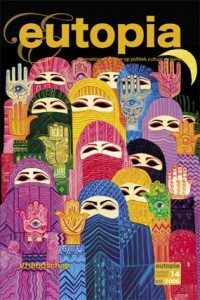 Developing and challenging new ideas on democracy, middle east, religion and transnational citizenship related to art and politics by multi-media works, (e-)print publishing and related e-magazines and by organizing public and professional meetings.
Developing and challenging new ideas on democracy, middle east, religion and transnational citizenship related to art and politics by multi-media works, (e-)print publishing and related e-magazines and by organizing public and professional meetings.
Eutopia concentrates on a variety of political and cultural issues, including the dialog between the Middle East and the West and developments linked to multiculturalism and the Muslim community in the Europe. Its global perspective is crucial.
For its activities Eutopia draws on an extensive network of freelancers, both at home and abroad, including philosophers, scientists, writers, journalists, artists etc. Eutopia’s good reputation is in fact partly based on its extensive network of contributors.
Eutopia is geared in particular – but not exclusively – towards dialog between North and South, as well as between Europe and the Islamic world. In addition, Eutopia aims to foster a concern for identity and intellectual development among young (migrant) individuals and to raise the quality of their input in European debates on social, cultural and political issues.
Eutopia concentrates on three core activities:
Eutopia E- Magazine: an international window on politics, culture and art.
Eutopia Live: lectures and workshops by and with artists and intellectuals; events and discussions about popular culture, film, literature and music.
Eutopia Academy: international exchange, conferences, networking and consultancy for cultural institutions.
Eutopia’s history and objectives
Eutopia, based in Amsterdam, was set up in 2002 by the sociologists Farhad Golyardi and Shervin Nekuee. Both Eutopia Magazine, of which so far twelve issues have appeared, and the Eutopia Live lectures and seminars have meanwhile found a niche of their own in Dutch cultural life. These activities are realized in collaboration with a great variety of local and nationwide institutions, including De Balie, De Unie, University of Amsterdam, Erasmus University Rotterdam, ISIM, Forum, Hivos, and the city of Amsterdam and the city of Rotterdam.
In general, Eutopia pursues closer collaboration with universities, governmental agencies and cultural institutions and foundations. Moreover, in the past few years, Eutopia has set up an extensive international network of scholars, authors, thinkers and artists in diaspora, many of whom are refugees. They provide major contributions to global intercultural dialogs and the formulation of new views about the dynamic of culture, identity and politics.
Eutopia aspires to develop into a more comprehensive interdisciplinary platform or institute that both nationally and internationally stimulates intercultural dialog in the areas of politics, science, culture and art. As such it fully follows in the prominent Dutch cultural tradition of politics and religious tolerance, which has spawned great thinkers such as Spinoza and Erasmus.
Eutopia is committed to promoting the debate on multicultural affairs in the Netherlands from a European and international perspective. What is the position of the Netherlands with respect to other European and immigration countries? Which social or cultural developments elsewhere have particular relevance for the Netherlands as an evolving multicultural society?
Go to: https://eutopiainstitute.org
David van Reybrouck – Revolusi. Indonesië en het ontstaan van de moderne wereld
In Nederland wordt een groot onderzoek gedaan naar het koloniale verleden*. Kolonialisme als oud zeer moet worden erkend, vindt ook David Van Reybrouck in zijn recent verschenen boek ‘Revolusi – Indonesië en het ontstaan van de moderne wereld’ waar hij vijf jaar intensief aan werkte. Het boek beslaat drie eeuwen, met veel aandacht voor de periode van de onafhankelijkheidsstrijd en dekolonisatie (1920-50).
Indonesië, het op drie na grootse land van de wereld, was het eerste dat na de Tweede Wereldoorlog, zijn onafhankelijkheid uitriep. Twee dagen na de Japanse capitulatie in augustus 1945 barstte een strijd los die meer was dan een conflict met de kolonisator Nederland. Op 17 augustus 1945 riep Soekarno de Onafhankelijkheid uit. Het was wereldgeschiedenis, het begin van de wereldwijde dekolonisatie. Pas in 1949 liet Nederland na veel strijd Indonesië gaan. Indonesië werd een voorbeeld voor andere koloniën, die in snel tempo ook onafhankelijk werden.
Tien jaar later organiseerde Soekarno, de eerste president van het land, de Asia-Afrika-conferentie van Bandung, het eerste mondiale congres zonder het Westen. Het werd een waterscheiding in de internationale politiek. In 1965 werd Soekarno afgezet en vervangen door de Soeharto. En kwam een einde aan de vrijheid in Indonesië. “Eigenlijk zijn we nooit onafhankelijk geworden’, concludeert Van Reybrouck.
In Revolusi verwerpt David Van Reybrouck het bekende nationale perspectief van de Indonesische vrijheidsstrijd. Bij de Indonesische onafhankelijkheidsstrijd waren meer partijen dan Nederland en Indonesië betrokken: Japan speelde een belangrijke rol met de bezetting van Indonesië, Groot-Brittannië, dat troepen stuurde, en de Verenigde Staten.
Naast het verrichten van research in archieven, interviewde hij vele plaatselijke jongeren waarmee de revolutie begon (inmiddels 90-plussers) die de grondslag legden voor een nieuwe wereld, de allerlaatste getuigen, die hij vond in Indonesische rusthuizen, op het platteland en op verafgelegen eilanden. Om de internationale dimensie te begrijpen, trok hij tevens naar Japanse miljoensteden, Nepalese bergdorpjes en Nederlandse buitenwijken.
De grote politieke ontwikkelingen verweeft Van Reybrouck met de vaak heftige herinneringen van hen die erbij waren. Zoals bij de in Nederland als Bersiap-periode bekende tijd, toen de Nederlandse troepen in 1945 terugkeerden en een golf van geweld begon. In Indonesië hoorde het geweld bij de omwenteling van de orde.
Hij laat honderden stemmen horen, die eerder niet werden gehoord.
Zo ontmoette hij Djajeng Pratomo, die in een rusthuis in Callantsoog zijn laatste jaren doorbrengt. Hij werd geboren in 1914, het jaar dat het koloniale rijk werd voltooid en als Indonesiër betrokken bij het verzet tegen nazi-Duitsland.
Een ander geïnterviewde geeft inzicht in het leven in ballingschap in Boven-Digul, Nieuw-Guinea, ver weg van Java en Sumatra. Deze onafhankelijkheidsstrijders werden onder vernederende omstandigheden geïnterneerd. ‘Nederland faciliteerde een soort Goelag voor ongewensten’, aldus Van Reybrouck.
Anderen getuigen over de verschrikkelijke honger en van Aziaten die in opdracht van Nederland met andere Aziaten moesten vechten. De oude mensen herinneren zich deze trauma’s nog steeds, hebben scherpe herinneringen aan deze periode.
In deze tastbare herinneringen schuilt zijn geschiedenis.
Het gaat over gewone mensen – in plaats van West-Europese mannen van een bepaalde leeftijd – die getuigen, en dat biedt een veelheid aan perspectieven en verhalen. Onderdrukkers en onderdrukten, Indonesische oud-strijders, bejaarde Gurkha’s, tot troostmeisjes.
Van Reybrouck schrijft de orale geschiedenissen op, zonder verwijten en dat maakt het des te indringender. Als er iemand verantwoordelijk is dan zijn dat de Nederlandse politieke leiders.
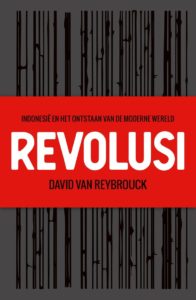 David Van Reybrouck hoopt dat het boek wordt gelezen, want licht werpen op de geschiedenis in de hoop dat ze erkend wordt, de pijn herkend wordt, kan een weg zijn naar genezing. En door deze pijn te herkennen biedt het boek hoop de hedendaagse problemen zoals het geweld dat we de planeet aan doen, op te lossen. Het boek functioneert als ‘achteruitkijkspiegel’.
David Van Reybrouck hoopt dat het boek wordt gelezen, want licht werpen op de geschiedenis in de hoop dat ze erkend wordt, de pijn herkend wordt, kan een weg zijn naar genezing. En door deze pijn te herkennen biedt het boek hoop de hedendaagse problemen zoals het geweld dat we de planeet aan doen, op te lossen. Het boek functioneert als ‘achteruitkijkspiegel’.
Van Reybrouck:
‘Mijmeren tijdens het kabbelen: zelfs als we met het kolonialisme uit het verleden ooit helemaal in het reine zijn gekomen, hebben we nog steeds niets gedaan aan de dramatische manier waarop we nu de toekomst koloniseren. De mensheid neemt de komende eeuw in met dezelfde meedogenloosheid waarmee in vroeger tijden werelddelen werden toegeëigend. Kolonialisme is niet langer iets territoriaals maar temporeels; het ergste ligt misschien niet achter ons, maar vóór ons. Wij gedragen ons als de kolonisatoren van de toekomstige generaties, wij ontnemen hun hun vrijheid, hun gezondheid, misschien zelfs hun leven.’
Indonesië en het ontstaan van de moderne wereld. De Bezige Bij, Amsterdam, 2020. ISBN 9789403183404
David van Reybrouck (1971) is cultuurhistoricus, archeoloog en schrijver. Zijn grootse succes was Congo. Een geschiedenis. In zijn essays Pleidooi voor populisme (2008) en Tegen verkiezingen (2013) pleit Van Reybrouck voor nieuwe vormen van democratie.
* zie: https://www.ind45-50.org)
Linda Bouws – St. Metropool Internationale Kunstprojecten
Tal Nitzan ~ I remember Etty Hillesum & The third child
I remember Etty Hillesum
Did she still whisper
“Why anticipate trouble”
when transported from Westerbork
to Auschwitz in Wagon Number 12,
“They should be exterminated like fleas,
those petty fears of the future”
as her future rushed towards her
to exterminate her?
Maybe I should pause, retreat
or at least recite
“Why anticipate joy”
as I hurry past the yellow squares of life
that once were far and sealed
and tonight open towards me
to let me in and out as I wish
while a silly hope for happiness
sways like a jug, too large,
on my head
“An interrupted life”, the diaries of Etty Hillesum, 1941-1943
Translation: Tal Nitzan & Vivian Eden
The third child
I’m your unknown child.
I’m the negative
between your two blue-eyed children
who radiate against my darkness.
I’m your forgotten, your vanished, I’m your
kicked away.
I kneel – while they close their eyes
and reach out their hands for the gift –
as if begging for the blow
that will not come.
I feed on the cocoa trail they leave,
on the rustle of wrappings.
I shrink at night into the corner
of their beds, where tiny stuffed animals
encircle them
like shelter against evil,
lurking for the nocturnal ritual,
when you step on my toes unseeing,
and bend to smoothe their plump blankets.
When you close your eyes
(green like mine!)
I’ll creep under your eyelids and murmur:
“Mommy”.
If you try to banish the nightmare of my face
you’ll find out, shamefully,
you don’t even know my name.
Translation: Tal Nitzan & Vivian Eden
Tal Nitzan was born in Jaffa, Israel, and has lived in Argentinia, Colombia, and U.S.A. (NY). She currently lives in Tel Aviv.
She is an awardwinning poet, writer, translator of Hispanic literature and editor.
Tal Nitzan published numerous poetry books.
https://www.facebook.com/IsraelinNY/
- Page 2 of 2
- previous page
- 1
- 2
